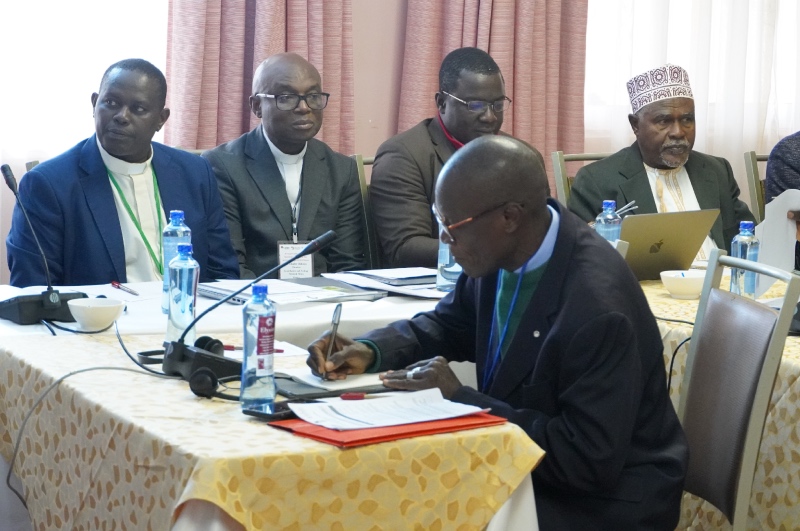



The theme of this forum is "Navigating Africa through Contemporary Crises: An Integrated Approach".
Africa currently faces numerous crises, notably the impacts of the COVID-19 pandemic, climate change, biodiversity loss, regional conflicts, and a burgeoning debt crisis.
These overlapping issues have led to increasing poverty, inequality, hunger, and governance challenges across the continent. To address these issues, the African Faith Leaders’ Meeting aims to utilize the moral authority, robust networks, and considerable resources of the Church to advocate for sustainable development.
Key discussions will revolve around the role of Special Drawing Rights (SDRs), foreign aid, and Multilateral Development Banks, considering their potential to provide financial resources to African countries for crisis response and economic recovery. The significance of good governance and accountability in the effective utilization of these resources will also be underscored.
Given its long-standing commitment to promoting social justice and human dignity, the Catholic Church is well-positioned to confront these challenges. Its vast network of educational institutions, healthcare facilities, and social service programs touch millions of lives, providing context-specific solutions to the continent's diverse issues.
The African Catholic Bishops Meeting seeks to capitalize on the Church's established network and expertise to promote sustainable development, reduce poverty and inequality, and encourage peace and reconciliation. This gathering offers a platform for African Catholic Bishops, experts, and stakeholders to identify collaborative opportunities within the Catholic community and across other denominations. The end goal is a robust set of strategies and recommendations to enable Africa to navigate and emerge stronger from its current crises.
This assembly aims to convene African Catholic Bishops, faith leaders from across the continent and development experts to discuss viable strategies for Africa to successfully navigate and recover from the current crises. The dialogue will scrutinize the situation from historical and future-oriented perspectives, examining structural impediments and charting a path towards a more equitable and sustainable future.
This two-day meeting at the Elysian Resort in Nairobi will consist of presentations, panel discussions, and interactive sessions. The presentations will outline the current scenario, emphasizing the interconnection between SDGs and social justice, especially in the context of debt and global financial mechanisms. Panel discussions will extract lessons from past crisis management at community and national levels, while interactive sessions will foster dialogue and collaboration to develop strategies for Africa's recovery.
This meeting will unite African Catholic Bishops, faith leaders from across the continent, and church and non-church experts specializing in sustainable development, international finance and debt, climate change, biodiversity, conflict resolution, and public health. Representatives from civil society, academia, and the private sector will also participate in this critical dialogue.
Objectives
1. To assess the repercussions of today's multiple crises on Africa and the continent's challenges in achieving sustainable development and interconnected SDGs.
2. To pinpoint opportunities for crafting development financing solutions that uphold the principles of sustainability, equality, and well-being while addressing the ongoing crises.
3. To promote interfaith cooperation and engagement with other stakeholders for coherent and holistic policies and measures.
4. To develop actionable strategies and recommendations to address the ongoing crises and support Africa's recovery.
Expected Outcomes
1. Enhanced understanding of the current crises' impact on Africa and the hurdles in achieving sustainable development and interconnected SDGs.
2. Concrete proposals for debt management and global financial restructuring based on sustainability, equality, and well-being.
3. Strategies to elevate the interfaith voice and influence in national, regional, and international decision-making platforms to support Africa's recovery.
4. Strengthened collaboration and coordination among stakeholders across various sectors for coherent and holistic policies and measures.
Related Articles
Select Payment Method
Pay by bank transfer
If you wish to make a donation by direct bank transfer please contact Fr Paul Hamill SJ treasurer@jesuits.africa. Fr Paul will get in touch with you about the best method of transfer for you and share account details with you. Donations can be one-off gifts or of any frequency; for example, you might wish to become a regular monthly donor of small amounts; that sort of reliable income can allow for very welcome forward planning in the development of the Society’s works in Africa and Madagascar.
Often it is easier to send a donation to an office within your own country and Fr Paul can advise on how that might be done. In some countries this kind of giving can also be recognised for tax relief and the necessary receipts will be issued.

